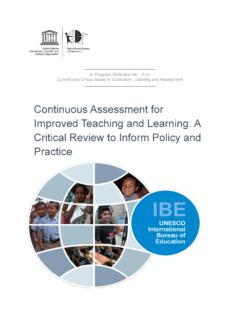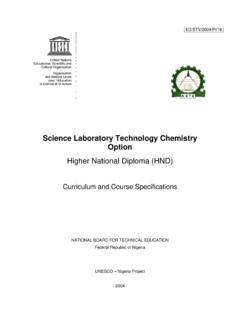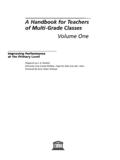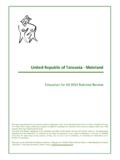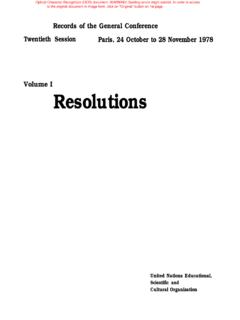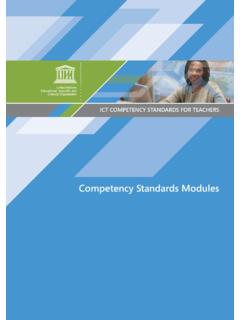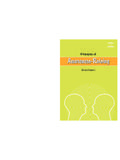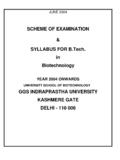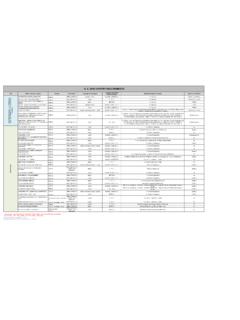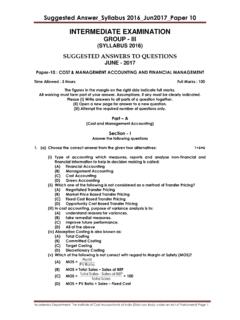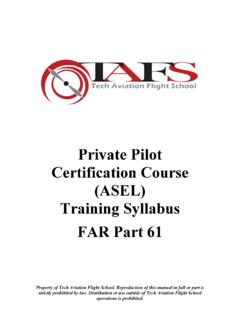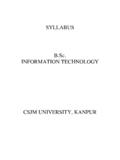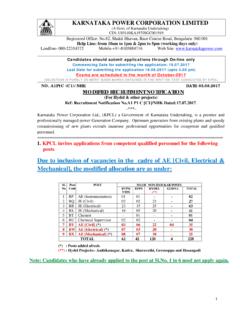Transcription of Electrical Engineering Technology National …
1 ED/STV/2001/PI/8. Electrical Engineering Technology National diploma (ND). Curriculum and Course Specifications National BOARD FOR TECHNICAL EDUCATION. Federal Republic of Nigeria UNESCO Nigeria Project 2001. Electrical Engineering Technology - National diploma (ND). National Board for Technical Education Curriculum and Course Specifications - 2001. PLOT B, BIDA ROAD, 2239 KADUNA - NIGERIA. National diploma (ND) IN Electrical Engineering Technology . 1. Table of contents GENERAL 4. CURRICULUM TABLE.
2 9. GENERAL STUDIES 11. Use of English .. 11. Communication Skills I .. 14. Communication Skills II .. 16. Report Writing .. 18. Citizen 22. MATHEMATICS COURSES .. 25. Algebra and Elementary Trigonometry .. 25. 32. Logic and Linear 36. Trigonometry and Analytical 41. BUSINESS COURSES .. 45. Entrepreneurship Development I .. 45. COMPUTER 49. Introduction to Computer Software .. 49. Introduction to Computer Hardware 55. Computer Hardware II .. 57. MECHANICAL Engineering 59. Basic Workshop Technology and 59.
3 Machine tools Technology and Practice .. 71. DRAWING 78. Technical Drawing .. 78. Electrical 84. Electrical Installation of Building .. 86. MEASUREMENT/INSTRUMENT COURSES .. 91. Electrical /Electronics Instrumentation I .. 91. Electrical /Electronics Instrumentation II .. 96. Electrical Engineering COURSES .. 100. Electric Power 100. Electric Power 103. Electric Power 106. Electric Machines I .. 112. Electric Machines II .. 116. Electrical Engineering Science I .. 120. Electrical Engineering Science II.
4 125. Electric Circuit Theory I .. 129. Electric Circuit Theory 132. 2. ELECTRONIC/TELECOMMUNICATION COURSES .. 135. Electronics 135. Electronics 139. Electronics 142. Telecommunication Engineering 145. Telecommunication Engineering 148. 152. Project .. 152. LIST OF MINIMUM 155. LIST OF BOOKS (ND) .. 163. GUIDELINES FOR TEXT BOOK 165. LIST OF PARTICIPANTS .. 166. 3. GENERAL INFORMATION. GOAL AND OBJECTIVES. The programme is designed to produce Electrical Engineering technicians for the following industries.
5 Manufacturing, assembling, servicing, power generation, transmission distribution and utilisation, telecommunications and other related industries. More specifically, diplomates of the programme should be able to: 1) Construct simple Electrical and electronic circuits when necessary for use in modification or as a part of a system;. 2) Assemble, install and test-run simple Electrical and electronic equipment;. 3) Carry out both preventive and corrective maintenance on simple electronic/ Electrical installation, equipment and appliances.
6 4) Select and use appropriate instruments to carry out simple tests and measurement on all types of Electrical and electronic installation and equipment under various operating conditions. 5) Operate relevant equipment and installations whenever required;. 6) Prepare simple bills of quantities and specifications related to Electrical /electronic Engineering works;. 7) Coordinate and supervise craftsmen in activities related to Electrical /electronic Engineering services 8) Maintain a personal logbook to record his daily and weekly activities for each semester.
7 GENERAL ENTRY REQUIREMENTS. National diploma (ND). The entry requirements for National diploma in Electrical Engineering Technology are: 1. Four credit level passes at senior school certificate examination (SSCE) or its equivalent at not more than TWO sittings. The four subjects must include Mathematics, Physics and any TWO other science subjects. At least a pass in English Language is required. 2. The National Technician Certificate (NTC) in Electrical trade with credit passes in Mathematics, Physics and ONE other subject.
8 Also a pass in English Language is mandatory. 3. Four credit passes in an NBTE recognised preliminary ND course offered in a polytechnics or similar post secondary technical institution. The credit passes must include Mathematics, Physics any TWO science subjects. Candidates must in addition obtain at least a pass in English language. 4. CURRICULUM. 1. The curriculum of all ND programme consists of four main components. These are: 1. General studies/Education 2. Foundation courses 3. Professional courses 4.
9 Supervised Industrial Work Experience Scheme (SIWES). 2. The General studies/education component shall include course in: i. Art and Humanities - English language, communication. These are compulsory ii. Mathematics and Science iii. Social Studies - Citizenship, political science, sociology, philosophy, geography, entrepreneurship studies. The courses in citizen, entrepreneurship are compulsory. 3. The General Education/studies components shall account for not more than 15% of the total contact hours for the programmes 4.
10 Foundation courses include courses in Mathematics, Pure Science., Computer Science, Technical Drawing, Descriptive Geometry and Statistics, etc. The number of hour will vary with the programme and many account of hours will vary with the programme and many account for about 10-15% of the total contact hour depending on the programmes. 5. Professional courses are course which give the student the theory and practical skills he needs to practice his field of specialisation at the technician/technologist level.

